Search titles
Displaying results 61 to 70 of 112.

Networked Governance of Freedom and Tyranny »
Peace in Timor-Leste
Authored by: John Braithwaite, Hilary Charlesworth, Adérito Soares
Publication date: March 2012
This book offers a new approach to the extraordinary story of Timor-Leste. The Indonesian invasion of the former Portuguese colony in 1975 was widely considered to have permanently crushed the Timorese independence movement. Initial international condemnation of the invasion was quickly replaced by widespread acceptance of Indonesian sovereignty. But inside Timor-Leste various resistance networks maintained their struggle, against all odds. Twenty-four years later, the Timorese were allowed to choose their political future and the new country of Timor-Leste came into being in 2002.
This book presents freedom in Timor-Leste as an accomplishment of networked governance, arguing that weak networks are capable of controlling strong tyrannies. Yet, as events in Timor-Leste since independence show, the nodes of networks of freedom can themselves become nodes of tyranny. The authors argue that constant renewal of liberation networks is critical for peace with justice – feminist networks for the liberation of women, preventive diplomacy networks for liberation of victims of war, village development networks, civil society networks. Constant renewal of the separation of powers is also necessary. A case is made for a different way of seeing the separation of powers as constitutive of the republican ideal of freedom as non-domination.
The book is also a critique of realism as a theory of international affairs and of the limits of reforming tyranny through the centralised agency of a state sovereign. Reversal of Indonesia’s 1975 invasion of Timor-Leste was an implausible accomplishment. Among the things that achieved it was principled engagement with Indonesia and its democracy movement by the Timor resistance. Unprincipled engagement by Australia and the United States in particular allowed the 1975 invasion to occur. The book argues that when the international community regulates tyranny responsively, with principled engagement, there is hope for a domestic politics of nonviolent transformation for freedom and justice.
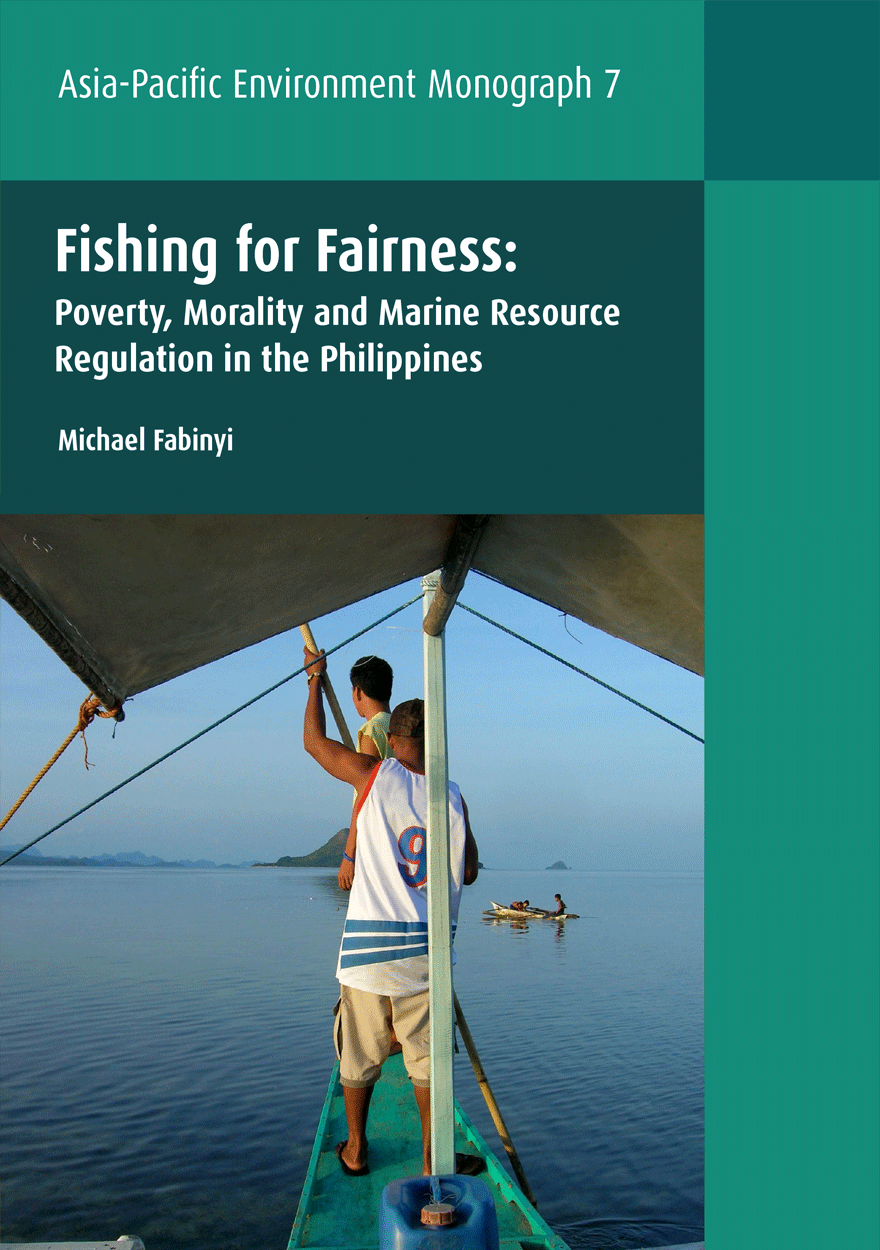
Fishing for Fairness »
Poverty, Morality and Marine Resource Regulation in the Philippines
Authored by: Michael Fabinyi
Publication date: January 2012
Fishing for Fairness develops an explicitly cultural perspective on environmental politics in the Philippines by analysing the responses of fishers to marine resource regulations. In the resource frontier of the Calamianes Islands, fishing, conservation and tourism provide the context where competing visions of how to engage with marine resources are played out. The book draws on data from ethnographic fieldwork with fishers, government and NGO officials, fish traders and tourism operators to show how the strategic responses of fishers to management initiatives are couched within particular cultural idioms. Tapping into broader notions of morality in the Philippines, fishers express a discourse that emphasises their poverty and the obligations of the wealthy to treat them with fairness. By deploying this discourse, fishers are able to reframe what are—on the surface—questions of environmental management into issues about poverty within particular social relationships. By using a cultural political ecology framework to analyse fishers’ responses to regulation, the book emphasises the distinctive ways in which marginalised people in the Philippines resist and reframe resource management initiatives. Fishing for Fairness will appeal to both academics and policy makers interested in marine resource management, political ecology, anthropology and development studies particularly throughout the Asia-Pacific.

East Asia Forum Quarterly: Volume 3, Number 4, 2011 »
Publication date: December 2011
East Asia Forum Quarterly grew out of East Asia Forum (EAF) online, which has developed a reputation for providing a platform for the best in Asian analysis, research and policy comment on the Asia Pacific region in world affairs. EAFQ aims to provide a further window onto research in the leading research institutes in Asia and to provide expert comment on current developments within the region. The East Asia Forum Quarterly, like East Asia Forum online, is an initiative of the East Asia Forum (EAF) and its host organisation, the East Asian Bureau of Economic Research (EABER) in the Crawford School of Economics and Government in the College of Asia & the Pacific at The Australian National University.
Download for free
Not available for purchase

Financing Higher Education and Economic Development in East Asia »
Edited by: Shiro Armstrong, Bruce Chapman
Publication date: November 2011
This volume addresses important issues to do with access to higher education and different models of its financing in the East Asia region. It is enriched by diverse perspectives from vastly different starting points and by the historical and institutional settings in the region. The issues are set out in the context of the value of higher education in economic development and how it contributes to the capacities to adopt and adapt to new technologies and undertake institutional innovation. The established and well-functioning higher education loan and financing systems, such as those in Australia, and the experience of different systems tried—both in East Asia and in the United States—are brought to bear in this volume.

Echoes of the Tambaran »
Masculinity, history and the subject in the work of Donald F. Tuzin
Edited by: David Lipset, Paul Roscoe
Publication date: October 2011
In the Sepik Basin of Papua New Guinea, ritual culture was dominated by the Tambaran —a male tutelary spirit that acted as a social and intellectual guardian or patron to those under its aegis as they made their way through life. To Melanesian scholarship, the cultural and psychological anthropologist, Donald F. Tuzin, was something of a Tambaran, a figure whose brilliant and fine-grained ethnographic project in the Arapesh village of Ilahita was immensely influential within and beyond New Guinea anthropology. Tuzin died in 2007, at the age of 61. In his memory, the editors of this collection commissioned a set of original and thought provoking essays from eminent and accomplished anthropologists who knew and were influenced by his work. They are echoes of the Tambaran.
The anthology begins with a biographical sketch of Tuzin’s life and scholarship. It is divided into four sections, each of which focuses loosely around one of his preoccupations. The first concerns warfare history, the male cult and changing masculinity, all in Melanesia. The second addresses the relationship between actor and structure. Here, the ethnographic focus momentarily shifts to the Caribbean before turning back to Papua New Guinea in essays that examine uncanny phenomena, narratives about childhood and messianic promises. The third part goes on to offer comparative and psychoanalytic perspectives on the subject in Fiji, Bali, the Amazon as well as Melanesia. Appropriately, the last section concludes with essays on Tuzin’s fieldwork style and his distinctive authorial voice.

East Asia Forum Quarterly: Volume 3, Number 3, 2011 »
Publication date: October 2011
East Asia Forum Quarterly grew out of East Asia Forum (EAF) online, which has developed a reputation for providing a platform for the best in Asian analysis, research and policy comment on the Asia Pacific region in world affairs. EAFQ aims to provide a further window onto research in the leading research institutes in Asia and to provide expert comment on current developments within the region. The East Asia Forum Quarterly, like East Asia Forum online, is an initiative of the East Asia Forum (EAF) and its host organisation, the East Asian Bureau of Economic Research (EABER) in the Crawford School of Economics and Government in the College of Asia & the Pacific at The Australian National University.
Download for free
Not available for purchase
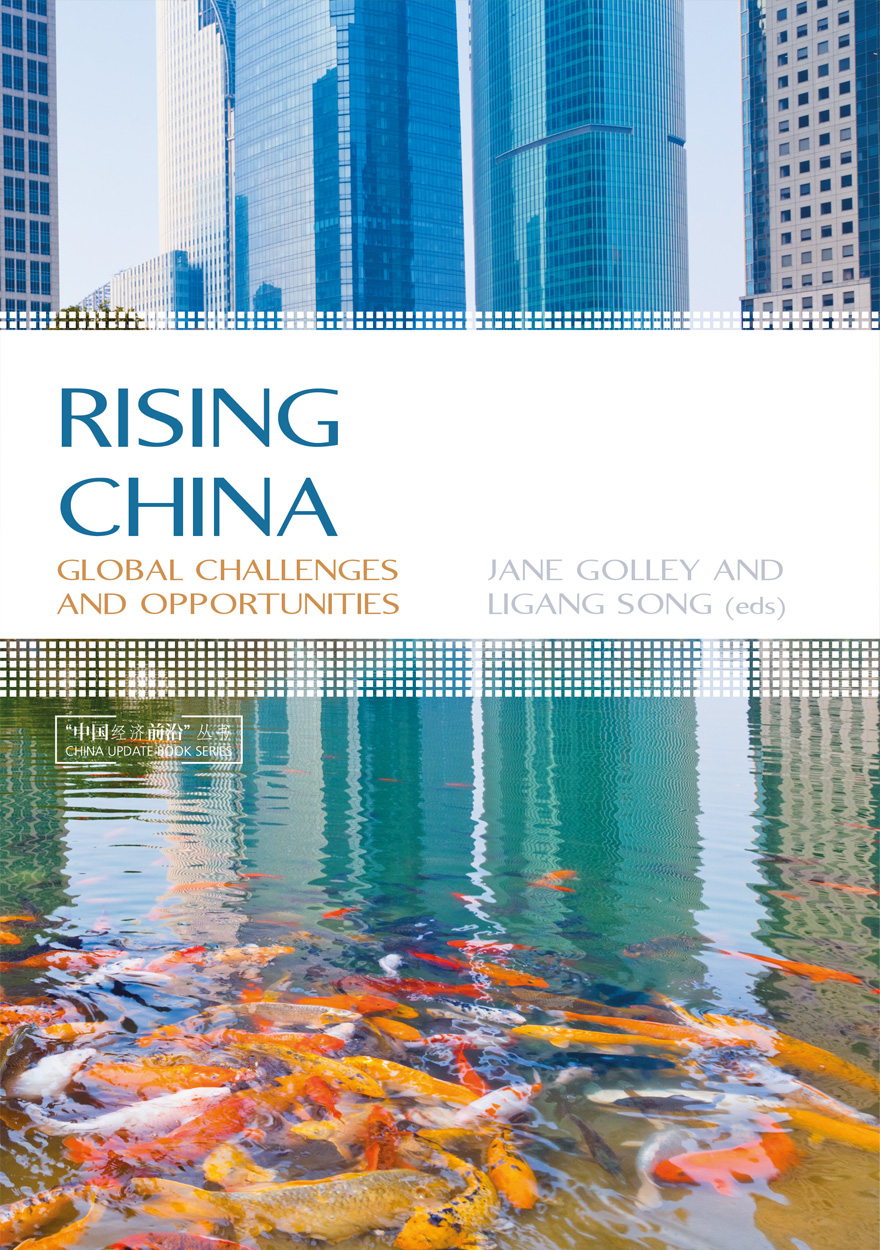
Rising China: Global Challenges and Opportunities »
Edited by: Jane Golley, Ligang Song
Publication date: June 2011
Where the last three decades of the 20th century witnessed a China rising on to the global economic stage, the first three decades of the 21st century are almost certain to bring with them the completion of that rise, not only in economic, but also political and geopolitical terms. China’s integration into the global economy has brought one-fifth of the global population into the world trading system, which has increased global market potential and integration to an unprecedented level. The increased scale and depth of international specialisation propelled by an enlarged world market has offered new opportunities to boost world production, trade and consumption; with the potential for increasing the welfare of all the countries involved.
However, China’s integration into the global economy has forced a worldwide reallocation of economic activities. This has increased various kinds of friction in China’s trading and political relations with others, as well as generating several globally significant externalities. Finding ways to accommodate China’s rise in a way that ensures the future stability and prosperity of the world economy and polity is probably the most important task facing the world community in the first half of the 21st century. The book delves into these issues to reflect upon the wide range of opportunities and challenges that have emerged in the context of a rising China.
Chinese translation
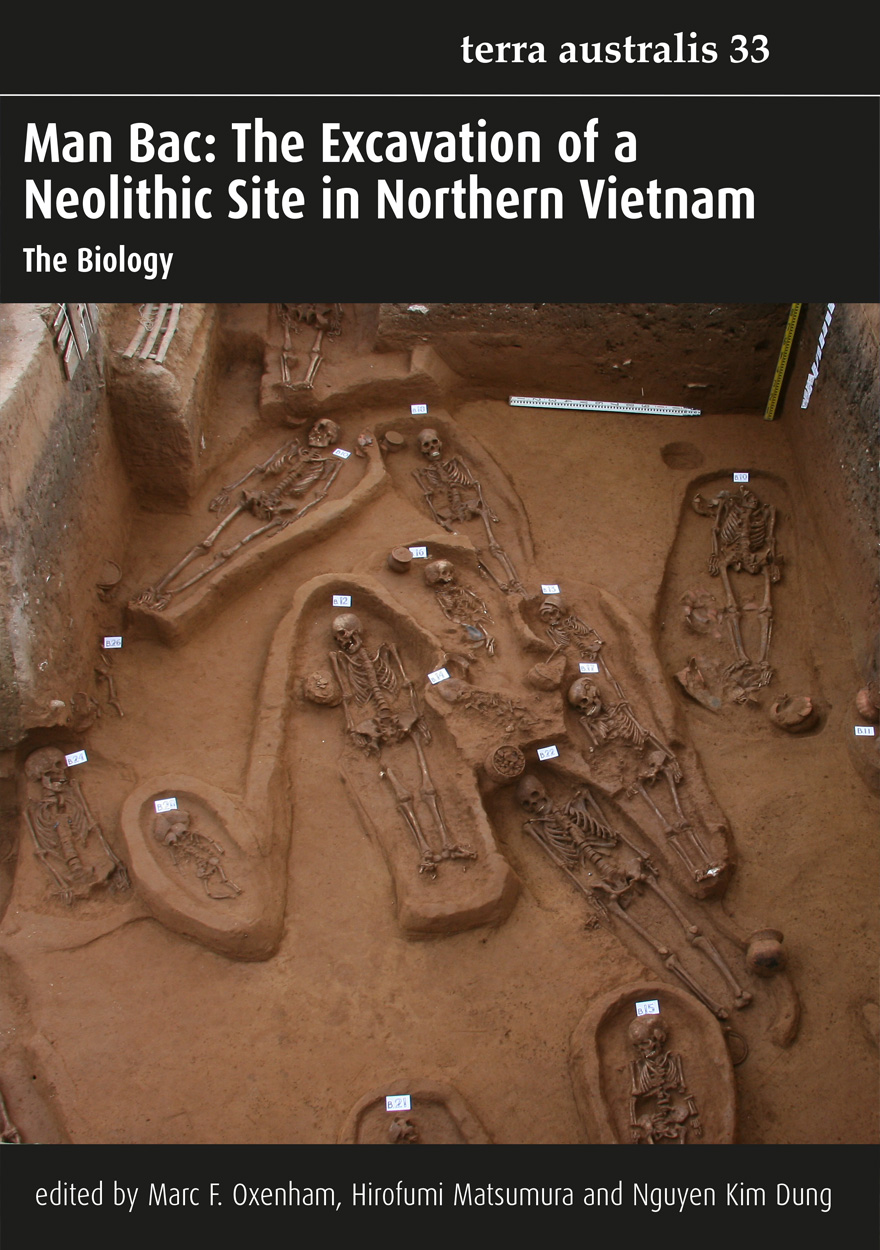
Man Bac »
The Excavation of a Neolithic Site in Northern Vietnam
Edited by: Marc F. Oxenham, Hirofumi Matsumura, Nguyen Kim Dung
Publication date: May 2011
The site of Man Bac in the Red River Delta of Vietnam, one of the most meticulously excavated and carefully analysed of Southeast Asian archaeological sites in the past few years, is emerging as a key site in the region. This book carefully analyses the human and animal remains and puts them into context. The authors describe in detail the health status, the unusual demographic profile and the interestingly divergent affinities of the cemetery population, and discuss their meaning, particularly in association with evidence for the use of marine and terrestrial animal resources; they argue convincingly that the site documents a time when the face of the region’s population was undergoing a fundamental shift, associated with a changing economic subsistence base. Physical anthropologists and archaeologists have argued for years over the timeline, the manner and the very nature of Southeast Asian population history, and this book is essential reading in this debate. Two supporting appendices describe the individual remains in detail.
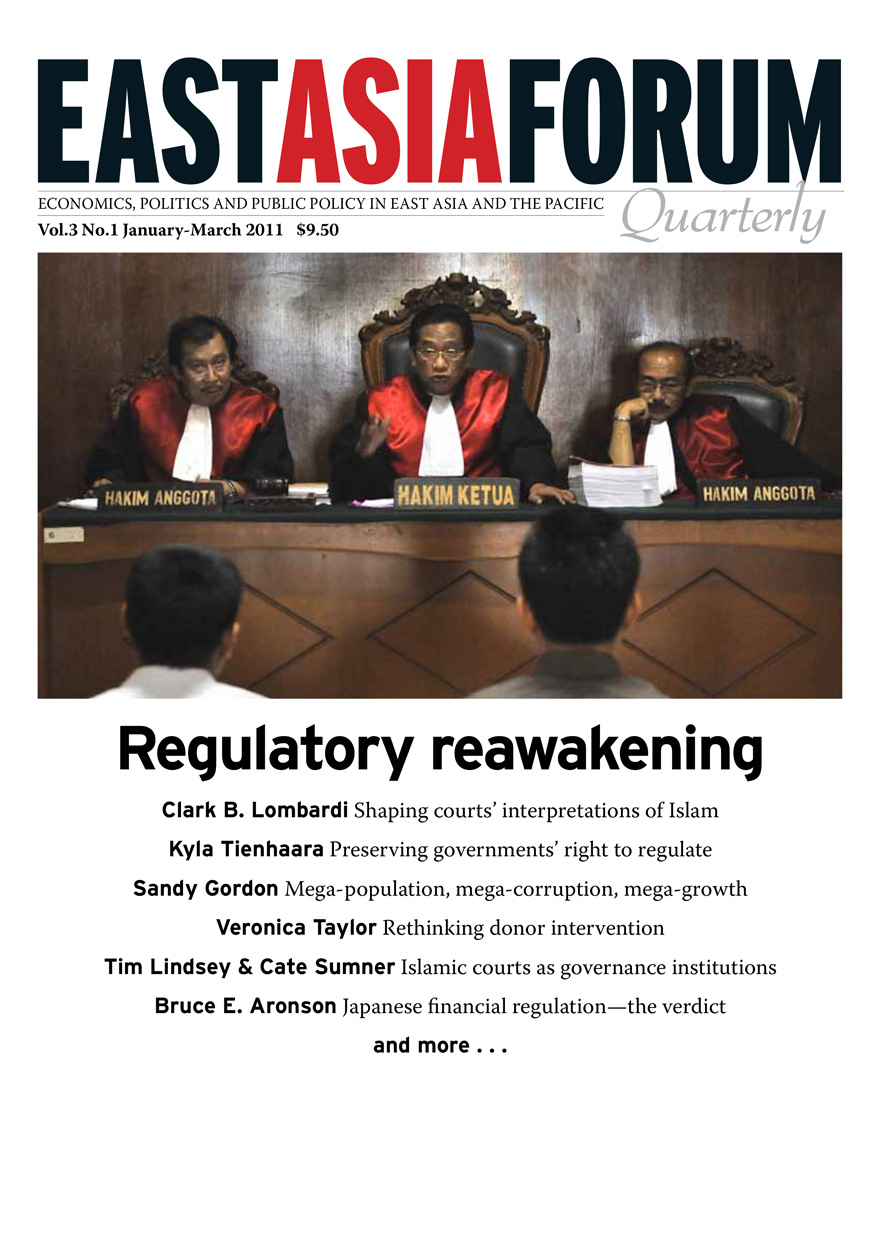
East Asia Forum Quarterly: Volume 3, Number 1, 2011 »
Publication date: April 2011
East Asia Forum Quarterly grew out of East Asia Forum (EAF) online, which has developed a reputation for providing a platform for the best in Asian analysis, research and policy comment on the Asia Pacific region in world affairs. EAFQ aims to provide a further window onto research in the leading research institutes in Asia and to provide expert comment on current developments within the region. The East Asia Forum Quarterly, like East Asia Forum online, is an initiative of the East Asia Forum (EAF) and its host organisation, the East Asian Bureau of Economic Research (EABER) in the Crawford School of Economics and Government in the College of Asia & the Pacific at The Australian National University.
Download for free
Not available for purchase
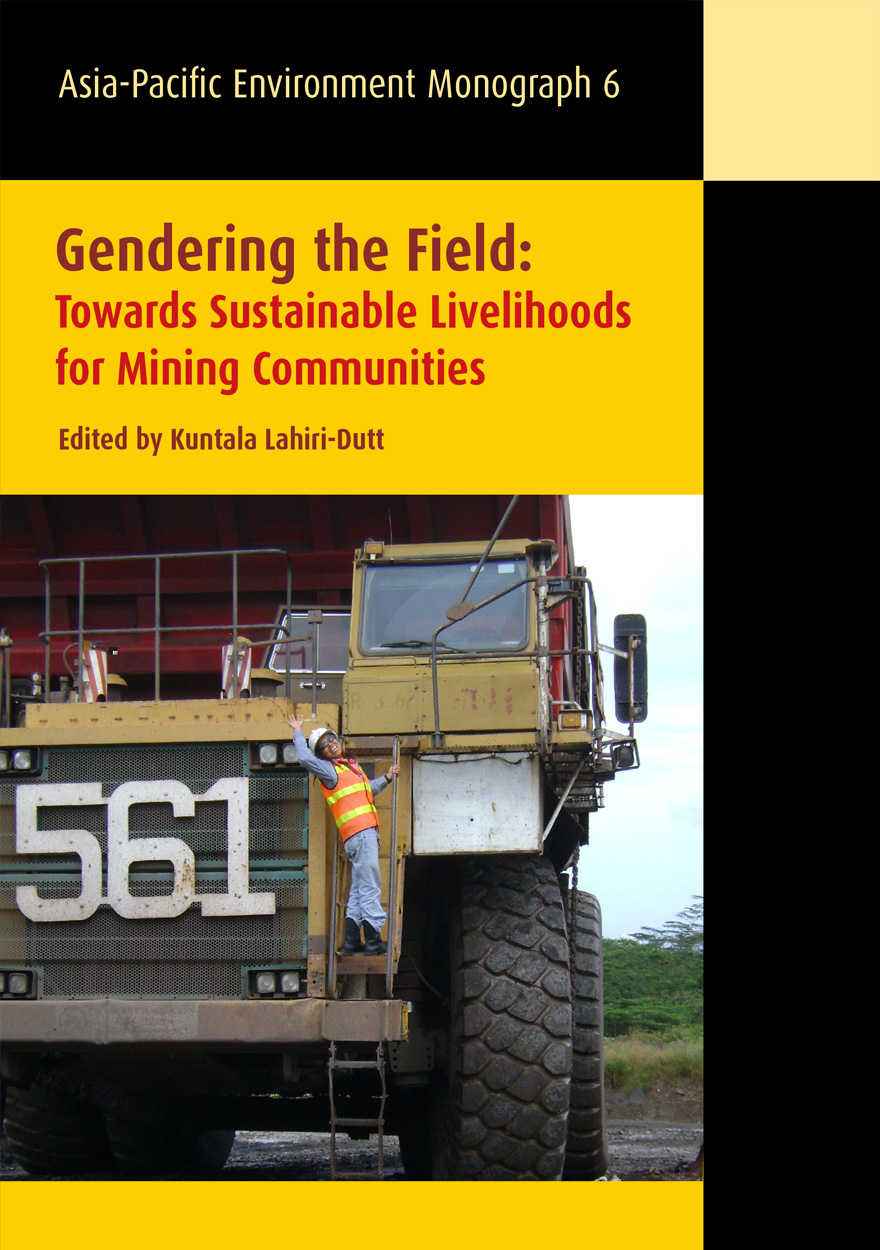
Gendering the Field »
Towards Sustainable Livelihoods for Mining Communities
Edited by: Kuntala Lahiri-Dutt
Publication date: March 2011
The chapters in this book offer concrete examples from all over the world to show how community livelihoods in mineral-rich tracts can be more sustainable by fully integrating gender concerns into all aspects of the relationship between mining practices and mine affected communities. By looking at the mining industry and the mine-affected communities through a gender lens, the authors indicate a variety of practical strategies to mitigate the impacts of mining on women’s livelihoods without undermining women’s voice and status within the mine-affected communities.
The term ‘field’ in the title of this volume is not restricted to the open-cut pits of large scale mining operations which are male-dominated workplaces, or with mining as a masculine, capital-intensive industry, but also connotes the wider range of mineral extractive practices which are carried out informally by women and men of artisanal communities at much smaller geographical scales throughout the mineral-rich tracts of poorer countries.



